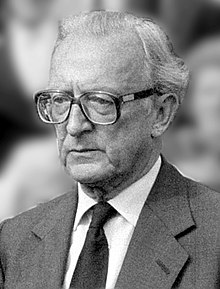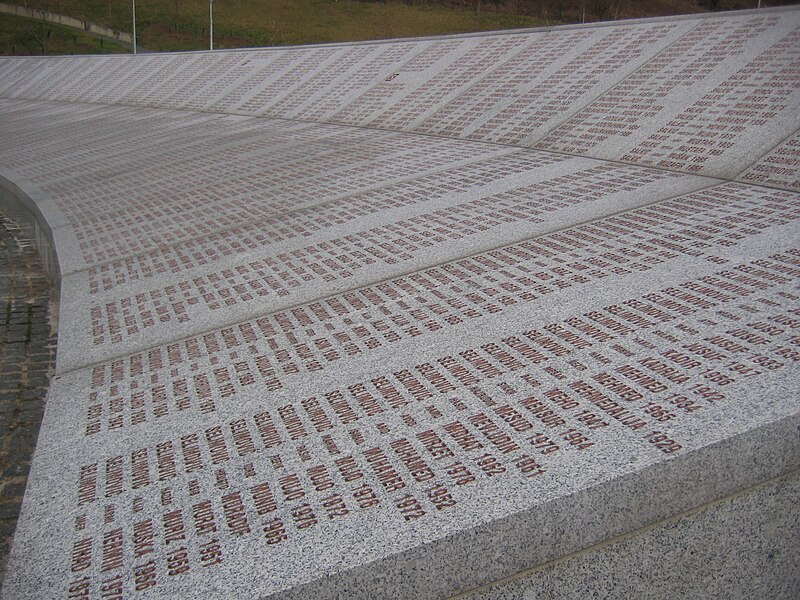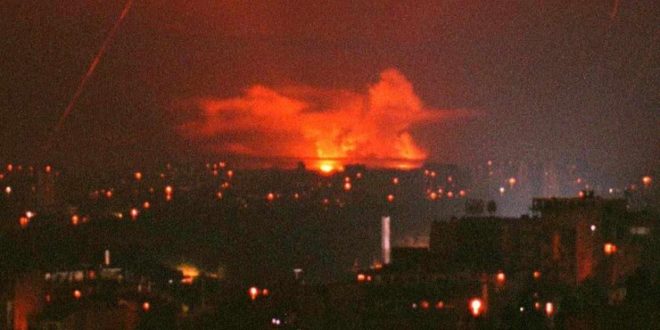Marcus Papadopoulos
Whilst there are no golden ages, it is abundantly clear that the world today is in a very unhealthy state. From Eastern Europe to North Africa to the Middle East, countries, in recent years, have been severely destabilised, resulting in carnage and the destruction of hundreds of thousands of lives.
And at the heart of that destabilisation is American and British foreign policy.
But how have we arrived at this situation in the world today? And what are the roots of America and Britain’s ‘humanitarian intervention’?
A lot of people answer the above questions by citing the illegal American and British invasion of Iraq. Well, they are emphatically wrong.
What we are seeing today in, for example, Syria, has its origins in 1991. Because that year was a turning-point in geo-politics. It was the year that saw the dismemberment of the Socialist Federal Republic of Yugoslavia and the dissolution of the Union of Soviet Socialist Republics.
Yugoslavia was the first step in a series of Western interventions in the world, including Iraq, Libya, Syria and Ukraine, and the West was able to successfully intervene in those countries because the Soviet Union is no more.
At the beginning of 1991, Yugoslavia found itself in a precarious and what proved to be a deadly situation for it. Yugoslavia was alone in Europe. The Yugoslav authorities were facing a US, UK, Germany and Austria which no longer needed Yugoslavia (as they had during the Cold War, when Yugoslavia pursued a policy of non-alignment), who did not want a socialist country in the new Europe, and who wanted to prevent Russian influence in the Balkans from potentially being established in the future. And owing to the Soviet Union being in its death throes, Moscow was unable to assist the Yugoslav government.
Yugoslavia was where the West/NATO’s policy of intervention was born, where international law would be completely sidelined and where alleged acts of genocide would provide NATO, under American leadership, with a pretext to intervene in, under the banner of humanitarianism. Western intervention in Yugoslavia would subsequently provide the catalyst for future western intervention elsewhere in the world in order for the US to strengthen its global hegemony. And it was in Yugoslavia where the American and British establishments would employ one of their most formidable weapons to justify their new interventionist policy: mainstream media. And US and UK mainstream media would subsequently take its new-found experiences and successes from Yugoslavia to new fronts – Iraq, Libya, Syria and Ukraine.

Despite Yugoslavia having been a founding member of the United Nations, and despite its borders having been internationally recognised under international law, Germany and Austria encouraged secessionist movements in Slovenia and Croatia to declare independence from Yugoslavia, while America did the same in regard to Bosnia and Herzegovina. Those actions by Berlin, Vienna and Washington were a serious violation of international law, completely undermined the UN charter and destroyed the sanctity of internationally recognised borders. Furthermore, the illegal actions of those Western powers ignited the terrible wars which would follow in Croatia and Bosnia. As Lord Peter Carrington, the former chairman of the peace conference on Yugoslavia, argued: The actions of the American, German and certain other European governments “made it sure there was going to be a conflict” in the Balkans.
But breaking up Yugoslavia was not enough for the West; it wanted to ensure that the successor states would become its client states hence it began providing weapons to the illegally armed groups in Croatia and Bosnia to bring about their victories on the battlefield.
In Croatia, the West armed what was, essentially, a fascist movement which glorified the Ustase, a Croatian fascist organisation which had ruled the pro-Nazi Independent State of Croatia during World War Two and which had committed genocide against the Serbian people at that time, murdering approximately 700,000 Serbs, some of whom were murdered at Jasenovac concentration camp, known as the Yugoslav Auschwitz. Returning to the 1990s, the largest act of ethnic cleansing during the Yugoslav civil wars was carried out by the Croats, when they executed the US-planned Operation Storm, resulting in the expulsion of over 250,000 Krajina Serbs from their ancestral homes.
In Bosnia, the Americans not only armed the secessionist Muslim forces there but also facilitated the transportation of Mujahideen fighters from Afghanistan to Bosnia to fight alongside Bosnian Muslim forces. Those Mujahideen fighters, who had previously fought against the Soviets in Afghanistan, not only committed some of the most sickening crimes of the Bosnian war but they also began to use their new-found presence in Europe to lay the foundation for the spread of Islamism and Islamism terrorism on the continent and beyond. Islamist fighters now enjoyed a forward-base in Europe. One of the Mujahideen fighters whom the Americans brought to Bosnia was Osama bin Laden, who was given a Bosnian passport by the Muslim authorities and, according to a Der Spiegel journalist, was seen at the Holiday Inn Hotel in Sarajevo in 1994.
The Serbs – who opposed the breakup of Yugoslavia and who did not want to be ruled by Croatian fascists and Muslim fundamentalists, terrified of their experiences during World War Two – were singled out by the West as the barrier to achieving its objectives in the Balkans. Enter Western mainstream media.

The Serbian people, who throughout their history have fought against foreign oppression (the Ottomans, the Austro-Hungarians, Imperial and then Nazi Germany), were depicted by Western media as mass murderers, mass rapists and perpetrators of genocide. Whilst those allegations were fabrications, they, nonetheless, paved the way for NATO to start bombing the Serbs in Bosnia, an act which had no basis under international law. As Major General Lewis MacKenzie, who was the United Nations Protection Force Chief of Staff and Commander of the Sarajevo Sector, said:
“Those of us who served as UN commanders in Bosnia realised the majority of the media reports were biased, to say the least. Whenever we tried to set the record straight we were – and continue to be – accused of being ‘Serbian agents’.”
So, NATO began bombing the Bosnian Serbs in 1994. However, the Americans and the British needed a far more intensive campaign not just to achieve their geo-strategic aims in Bosnia but to establish a precedent for future Western/NATO intervention in other regions of the world, and to also show off NATO’s prowess and thereby intimidate countries which followed an independent foreign policy. And the alleged genocide at Srebrenica, in July 1995, would provide Washington and London with what they were looking for. To this day, Srebrenica remains the foundation of the West’s ‘humanitarian intervention’, and it is what American and British politicians and journalists cite when they call for military intervention in a country, as they did in Libya and Syria.
But what happened at Srebrenica, in the summer of 1995, was not as clear-cut as Western politicians and journalists would have us believe. Let me quote you the words of Dr Efraim Zuroff, the Director of the Simon Wiesenthal Centre in Jerusalem:
“As far as I know, what happened there [at Srebrenica] does not fit the description or definition of genocide. I think the decision to call it genocide was made for political reasons.”
Now, let me now quote you the words of General Major Carlos Martins Branco, of the Portuguese Armed Forces, and who served as a UN military observer in Bosnia in 1995:
“Srebrenica was portrayed – and continues to be – as a premeditated massacre of innocent Muslim civilians. As a genocide! But was it really so? A more careful and informed assessment of those events leads me to doubt it.”
The story of Srebrenica did not, in fact, begin in 1995; rather, it began in 1992, when Muslim forces, operating from Srebrenica, under the leadership of the infamous Naser Oric, started a three year orgy of massacres against Serb civilians in adjacent Serbs villages. In a period of three years, over 3,000 Serbs were murdered by Muslim forces in some of the most barbarous ways imaginable.
In the summer of 1995, the Bosnian Serb army was presented with an opportunity to conquer Srebrenica and end the massacring of Serbs villagers. But it was a trap set by Bill Clinton and the Bosnian Muslim leader, Alija Izetbegovic, who were both looking for “genocide” so that NATO would have the “justification” to extensively intervene in Bosnia.
Incidentally, allow me to quote part of an interview that Bernard Kouchner, a former French Foreign Minister, had with Izetbegovic, when the Muslim leader was on his deathbed. Kouchner said to Izetbegovic:
“They [the camps in Bosnia] were horrible places, but people were not systematically exterminated. Did you know that?”, asked Kouchner, to which Izetbegovic replied: “Yes. I thought that my revelations could precipitate bombings.The assertion was false. There were no extermination camps.”
What happened at Srebrenica in the summer of 1995 was, in my opinion, a war crime, not genocide. A war crime because some Serb soldiers, not acting under orders, took it upon themselves to exact revenge against Muslim soldiers. Perhaps around 800 Muslim soldiers were executed by those Serbs. A terrible act but one that was a war crime, not genocide.
Furthermore, thousands of Muslim soldiers were killed in combat with the Serbs, mainly during their retreat from Srebrenica through the forests to Tuzla.
Now, what is genocide? Genocide is the systematic extermination of an entire people based on their ethnicity.So, for example, the genocide committed against the Jews in World War Two, resulting in the deaths of six million Jewish people, and the genocide committed against the Armenians in World War One, resulting in the deaths of one million Armenian people.
But at Srebrenica, in the summer of 1995, the Serbs, according to a UN document, allowed 35,632 Muslim elderly, women, children and young boys to leave Srebrenica, most of whom went to Tuzla. Now, let me again quote Major General Lewis MacKenzie:
“It’s a distasteful point, but it has to be said that, if you’re committing genocide, you don’t let the women go since they are key to perpetuating the very group you are trying to eliminate.”
And that is why Dr Efraim Zuroff said that:
“I wish the Nazis moved aside Jewish women and children before their bloody rampage, instead of murdering them, but that, as we know, did not happen [at Srebrenica].”
The reason why the governments and mainstream media in the US and the UK will viciously denigrate any discussion questioning their official narrative of Srebrenica is because the very basis of the West’s ‘humanitarian intervention’ is built upon the alleged Srebrenica genocide.

By the end of the wars in Croatia and Bosnia, international law had been left reeling, while the US reigned supreme in the world. The path to future intervention in the region and elsewhere in the world was now open to the West.
But the US and the UK were not quite finished in the Balkans. The Federal Republic of Yugoslavia, comprising Serbia and Montenegro, and which emerged from the ashes of the Socialist Federal Republic of Yugoslavia, was a socialist-run country, albeit with elements of a free market economy in it, and which had close relations with Russia (and China, to an extent). To complete their hold over the Balkans, the Americans were intent on destroying the Federal Republic of Yugoslavia, imposing a pro-Western government in Belgrade and commencing with the colonisation of Serbia and Montenegro. But Washington needed a pretext. And in 1999, the Americans found it: Kosovo.
Kosovo and Metohija is the cradle of Serbian civilisation and the soul of the Serbian identity. This land is the Serbs’ Jerusalem. As a result of demographic changes, especially because of huge Serb fatalities in World War One and World War Two, Serbs are a minority in Kosovo and Metohija today, with the majority of the population being Albanian. In 1998, the Kosovo Liberation Army, an Albanian terrorist and organised crime group, with links to Islamist terrorism, began a murderous campaign in Kosovo and Metohija against Serb and Albanian civilians and police and military personnel, with the aim of making the province independent.
Washington, which had previously designated the KLA a terrorist organisation, began giving political and military assistance to the KLA. But, by the beginning of 1999, the Yugoslav military had all but destroyed the KLA. So the US realised that in order to achieve its goal in colonising Serbia and Montenegro, it had to directly intervene in Kosovo and Metohija, on the side of the KLA. However, the Americans needed a pretext. So US and UK journalists began alleging that the Serbs were carrying out genocide against the Albanians in Kosovo and Metohija, citing numbers of 500,000 Albanians murdered.
Then, following a battle between Yugoslav soldiers and KLA terrorists at a place called Racak, the Americans and the British claimed that they had found a ‘smoking gun’ to justify NATO intervention, claiming that Albanian civilians had been murdered there, something that was subsequently proved to be false. After Belgrade refused an ultimatum from the US, NATO began a brutal 78 day air campaign against Yugoslavia, including striking civilian targets across the country and dropping depleted uranium shells on civilian areas, an act which, subsequently, caused a massive increase in cancer rates amongst the Serbian population.
NATO’s air campaign against a sovereign country and a member of the UN, without the permission of the United Nations Security Council, remains the most atrocious attack on international law to this day and has left the international rules-based system impaired ever since. What the Americans and the British did to Serbia set the precedent for the invasion of Iraq, the bombing of Libya and American direct military intervention in Syria.
In 2008, Washington and London encouraged and recognised the unilateral declaration of independence by Albanians in Kosovo, a flagrant violation of international law and the internationally recognised borders of Serbia.
Regarding American and British allegations of genocide in Kosovo and Metohija, in 2000, a UN pathologist team, comprising of Spanish doctors, unearthed approximately 2,000 bodies in the Serbian province, both Serbs and Albanians, most of whom had died in combat. Like the West’s allegation of weapons of mass destruction in Iraq, its allegation of genocide in Kosovo and Metohija was a lie.
So the actions of the West in the former Yugoslavia set the precedent for what the West would later on do in Iraq, Libya, Syria and Ukraine. The concept of independent, sovereign states, enshrined in international law, was destroyed by the West in the former Yugoslavia.
Now, I said, at the beginning of this piece, that 1991 was also a defining year for the international arena because this was the year in which the USSR ceased to exist.
From 1945 until 1991, the Soviet Union constituted a formidable counter-balance to the US on the international stage.
But with the weakening and dissolution of the Soviet colossus, this paved the way for the West to achieve global dominance and to bomb and/or invade sovereign countries, in geo-strategic parts of the world, to get its way.
The Russian Federation was incapable of preventing the dismemberment of Yugoslavia, the bombing of Serbia, the invasion of Iraq, the bombing of Libya and the fermenting of the conflict in Syria. It is a moot point but had the Soviet Union not been dissolved, then I believe that the aforementioned events would not have occurred, mainly because the US and its allies would not have tried it on in the first place because of the deterrence that was the USSR.
Because of the catastrophe that was Mikhail Gorbachev and Boris Yeltsin, the US and the UK were provided with a golden opportunity to do as they pleased in the world…and they gleefully took this opportunity.
Now, Russia, in 2018, under the strong leadership of Vladimir Putin, has regained a lot of its lost superpower status. But Russia is still in the shadow of the Soviet Union in terms of power. I believe that that situation will change in the future but it will take considerable time.
Vladimir Putin must sit in his office lamenting that had Mikhail Gorbachev been an effective leader, then he, Vladimir Vladimirovich, would today be the General Secretary of the Communist Party of the Soviet Union and in charge of a superpower. The year 1991 changed the course of history. The destruction of Yugoslavia and the death of the Soviet Union brought about the carnage which the world has witnessed ever since then. For the West, 1991 was a glorious year as it heralded the beginning of Western global mastery. But for countries in geo-strategic parts of the world which pursued independent foreign policies, 1991 would constitute a fatal year, both literally and metaphorically speaking.
_____________________
Dr Marcus Papadopoulos is a specialist on Russia and the rest of the former Soviet Union and the former Yugoslavia.
 Geostrategic Media Political Commentary, Analysis, Security, Defense
Geostrategic Media Political Commentary, Analysis, Security, Defense





